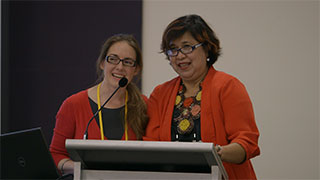Need help now?
Register for updates
Latest News
CONSULTATION: Draft Principles Document for Translation & Interpretation of Mental Health and Suicide Prevention Information Resources into languages other than English.
Thursday, July 09, 2015
**Consultation**
As part of the MHiMA Work Programme a draft principles document has been developed to provide an agreed, nationally consistent, approach in regard to translation and interpretation of mental health and suicide prevention information resources into languages other than English that target people from culturally and linguistically diverse (CALD) backgrounds in line with best practice principles. We want to hear from you, our stakeholders, on your thoughts around the content of the document.
Feedback sought from all stakeholders by Monday 22nd July. Please send responses to [email protected]
View Draft Document here
Metro South Health's article supporting MHiMA and the mental health needs of people from CALD backgrounds
Tuesday, June 16, 2015
Metro South Health Fortnightly Focus edition 20 - view article here
12 June 2015
Supporting the mental health needs of people from CALD backgrounds
Mental illness can affect anyone within our community, across all socioeconomic and cultural backgrounds. People who speak English as a second language or are a part of a cultural minority can be particularly vulnerable when faced with the challenges of mental illness due to feelings of isolation and not knowing where to turn for help.
This is why the work of the Mental Health in Multicultural Australia (MHiMA) project is important as it acts as an advocate for people from Culturally and Linguistically Diverse (CALD) backgrounds living with mental illness. The MHiMA project is funded by the Australian Government Department of Health to provide a national focus for advice and support to providers and governments on mental health and suicide prevention for people from CALD backgrounds.
In April, MHiMA welcomed the release of the National Mental Health Commission’s Review of Mental Health Programmes and Services and is working with the Commonwealth and stakeholders to progress three priority areas from the report: meaningful service redesign of mental health services that optimally impacts on frontline organisation and quality of culturally responsive care; reducing red tape through nationally consistent legislation at Commonwealth, State and Territory Levels; and data collection and measurement.
MHiMA recently released a video outlining the implementation of the framework for multicultural Australia. This framework provides government agencies and mental health organisations with a structure to guide their work in line with MHiMA’s goal of achieving culturally inclusive services on a National level. In May, the video was broadcast at a symposium for the Royal Australian and New Zealand College of Psychiatrists and was well received by attendees. The processes outlined in the video and framework are important guides for Metro South Addiction and Mental Health Services as we seek to better engage with our community and improve the quality of care provided across the service.
It is a busy and exciting time for the MHiMA project. These key initiatives will ensure that we can work towards building the services, mechanisms and support needed to ensure that everyone in our community and across Australia can access timely and effective mental health care no matter what their background.
Professor David CromptonExecutive Director
Addiction and Mental Health Services
Metro South Health
View article here
Transcultural Mental Health Services at the cross roads
Thursday, June 04, 2015
For the past twenty years, Transcultural Mental Health Services (TMHS) have been at the forefront in frontline mental health services addressing the significant disparities in access and quality of care received by people from culturally and linguistically diverse (CALD) backgrounds in Australia. Via the provision of specialist clinical consultation and assessment services, workforce education and promotion, prevention and early intervention programs, Australia is regarded as a leader in transcultural mental health internationally.
Collectively Transcultural Mental Health Services have delivered clinical services to well over 50,000 immigrants and refugees nationally and their promotion and prevention programs have delivered culturally tailored services to hundreds of thousands of people in Australia’s multicultural communities. With a recurrent investment of less than $4 million per annum this represents excellent value for money.
Despite this impressive track record, Transcultural Mental Health Services do face ambiguity around state-wide roles and functions in an ever changing health policy context; and having explicit mandate to operate on a statewide basis would better position such critical services to play their part effectively in future mental health reform. It is in this context that there are practical opportunities in the immediate future which include:
-
Getting clarity around roles, responsibilities and scope of statewide services; and optimising co-investment from Federal and State funding in specialist statewide transcultural mental health services as part of forthcoming the Federation White Paper process;
-
Expanding the role of Transcultural Mental Health Services beyond primary and secondary clinical consultation services which are currently state funded so that their remit is broader by being able to explicitly work across the continuum of care particularly in the areas of promotion, prevention and early intervention in the primary healthcare space. There is a real opportunity to enable more efficient and cost effective care frontline care for people of culturally and linguistically diverse backgrounds through Commonwealth investment in the newly reconfigured Primary Health Networks (PHNs).
The diversity of the Australian population necessitates public policy settings which ensure equity and access in the planning and delivery of health services. The recent review of mental health services and programs by the National Mental Health Commission acknowledged that “‘many people with mental health difficulties face compounding disadvantage with specific recognition of marginalisation of those from diverse cultural backgrounds” [1].
The Review’s recommendations in relation to responses for different population groups are welcomed with specific references to the adoption of the ‘Framework for Mental Health in Multicultural Australia: Towards culturally inclusive service delivery’[2] as a tool to help organisations identify what they can do to enhance their cultural responsiveness; the requirement for PHNs to partner with state-wide transcultural mental health services in planning and developing services; and the adoption of clear and explicit equity-oriented targets for people from CALD backgrounds for inclusion in government funding agreements.
Transcultural Mental Health Services are well placed to make a valuable contribution to these developments, which if followed through, will potentially change the way people from CALD backgrounds engage with mental health services. From current ad hoc examples of good practice, mainly in the four states where TMHS currently exist, to long term sustained change across the spectrum of services, particularly if equity oriented targets are achieved in funding agreements which will significantly increase the funding base for specialist multicultural mental health services and programs.
TMHS have been the pre-eminent reference point for resources, training and clinical expertise in culture and mental health. At the population health level, TMHS have also made a valuable contribution. Decades of experience of population health practice have demonstrated that the community’s health is determined by so much more than the quality and availability of health services. For CALD communities the social determinants of health are even more significant with many factors relating to migration and settlement experience resulting in socio-economic disadvantages in areas of employment, language, access to health and social services, racism and discrimination. It is well established that mental disorders, as with most other health conditions, arise from the interplay of biological, psychological and social factors[3].
For the past twenty years, TMHS have successfully engaged with the wide range of different ethnocultural groups reflecting the different waves of migration and patterns of resettlement influenced by changing economic and political pressures across the globe. Given the exposure to working transculturally with each wave of new arrivals, TMHSs are afforded invaluable opportunities every day to learn about different cultural idioms of distress and the cultural beliefs and values that may influence the presentation of a mental disorder from one culture to the next. The solid connections forged between TMHS and different community groups facilitate ongoing development of innovative strategies for cultural responsiveness and sensitivity in service delivery. These relationships are integral in the work of TMHS to reduce stigma, increase mental health literacy among ethno-specific communities and maintaining an updated understanding of the mental health needs of these communities. The knowledge gained from these connections are valuable not only for ensuring that any training material developed by TMHS are context relevant, topical and applicable, but also to inform on policy at the state and national level on mental health issues pertaining to ethno-cultural communities.
Engagement with community stakeholders is pivotal to the business of transcultural mental health. This involves representing the voice of transcultural mental health issues on relevant committees and steering groups to ensure that critical aspects of transcultural mental health are given due consideration prior to initiatives being funded or implemented.
TMHS are pivotal to mental health service reform as we move forward. In the wake of changing funding models and the ongoing devolution that is being implemented across Australia’s health system, the capacity for TMHS to facilitate the inclusion of those marginalised by language and culture within their statewide jurisdictions must not be compromised. The collective strategic objective of all of Australia’s TMHS to work in unison for collective impact across the nation and at the many levels they do on a daily basis is vital for a mentally healthy multicultural Australia.
[1] National Mental Health Commission, 2014: The National Review of
Mental Health Programmes and Services, Sydney NMHC. Published by NMHC,
Sydney
[2] Framework for Mental Health in Multicultural Australia: Towards culturally inclusive service delivery: Mental Health in Multicultural Australia (MHiMA) 2014
[3] Fourth National Mental Health Plan Working Group (2009). Fourth National Mental Health Plan:an agenda for collaborative government action in mental health 2009-2014. Canberra: Australian Government Department of Health and Ageing
National Mental Health Commission statement and position paper on Seclusion and Restraint
Thursday, June 04, 2015
National Mental Health Commission Position Paper: A Case For Change
Jackie Crowe, the Commissioner at the National Mental Health Commission released a position paper on seclusion, restraint and restrictive practices in mental health at the 10th National Seclusion and Restraint Forum in Melbourne on 29th May 2015.
The position paper has been informed by an international literature review, surveys and focus groups with people who have a lived experience of seclusion and restraint. This work was undertaken by the University of Melbourne, and in partnership with the Mental Health Commission of Canada and key Australian partners, including the Safety and Quality Partnerships Subcommittee, Australian Human Rights Commission, and interested state mental health commissions. In addition, the Core Reference Group provided expert advice to the Commission and the project team, and oversaw the project team’s work.
The Commission urges all Australian governments to support the commitment made in 2005 to reduce and where possible to eliminate the use of seclusion and restraint by giving priority to achieving:
- jurisdictional agreement on definitions for seclusion, physical restraint, mechanical restraint and chemical restraint that is then reflected in jurisdictional legislation
- targets and reporting frameworks that ensure that we have consistent, national data that give an accurate and meaningful account of what’s really going on
- a national approach to the regulation of seclusion and restraint that
includes:
- standards and guidelines to support national consistency in approach to reducing the use of seclusion and restraint
- inclusion of a standard specifically addressing restrictive interventions in the next revision of the National Safety and Quality Health Service Standards
- national monitoring and reporting on seclusion and restraint across jurisdictions and services.
View the Documents:
National Mental Health Commission position statement
National Mental Health Commission position paper
University of Melbourne Report Overview
MHiMA National CALD Consumer and Carer Working Group Media Release
Thursday, May 14, 2015
MHiMA National Culturally & Linguistically Diverse (CALD) Consumer & Carer Working Group (NCCCWG)
Release Date: Thursday, 14th April 2015, 4pm (AEST) for immediate release.
Supporting the Call for the Inclusion of Consumer and Carers in
National Mental Health Reforms
The MHiMA National CALD Consumer and Carer Working Group (NCCCWG) supports the call from the National Mental Health Consumer Carer Forum (NMHCCF) for the views of people living with mental illness and their carers to be included in the proposed working groups announced by Minister Ley on Thursday 16th April 2015. The Minister’s announcement was in response to recommendations in the National Mental Health Commission (NMHC) Review of Programmes and Services.
“The voices of consumers and carers are critical to ensuring that these recommendations are informed directly by the those living with mental illness on a daily basis, and we fully support the call by the NMHCCF for the inclusion of consumers and carers in these forums”, said Ãine Tierney MHiMA Consumer and Carer Support Officer who spoke on behalf of MHiMA NCCCWG members.
Most importantly, MHiMA NCCCWG members are pleased that the NMHC Review has included recommendations which acknowledge the importance of addressing the needs of people living with mental illness from immigrant and refugee backgrounds.
“We’d like to ensure a meaningful engagement of people from multicultural backgrounds in the development of future initiatives in mental health and we’d welcome opportunities for a national dialogue in regard to these important issues.” Miss Tierney said.
A practical way, in which we would like to see this achieved, is by the appointment of a Multicultural Mental Health Commissioner based alongside existing Commissioners serving on the NMHC. This is a really critical and important opportunity for the Commonwealth to have access to expertise from the multicultural mental health sector and from MHiMA NCCCWG members to address and bring about tangible improvements to frontline services.
“Such an approach would demonstrate the Government’s commitment to working in partnership with multicultural stakeholders to formulate a solid and enduring policy and funding response to mental health reform that is inclusive of all Australians” said Miss Tierney.
The MHiMA Project has well established links with multicultural mental health stakeholders and consumers and carers who are able to provide professional expertise alongside the collective and individual stories of lived experience. The MHiMA NCCCWG is ready to work in partnership alongside government and other key sector stakeholders and consumers and carers in creating national mental health reform.
The NMHC review proposes a number of recommendations targeting CALD mental health. The MHiMA Project response to the review can be found here: MHiMA response to the National Mental Health Commission Review
For more information or comment please contact Hamza Vayani, National Project Manager MHiMA on 1300 136 289 during business hours.
The MHiMA NCCCWG represents consumers and carers of multicultural backgrounds from Australian Capital Territory, New South Wales, Northern Territory, Queensland, South Australia, Victoria and Western Australia and is a member organisation of the NMHCCF. The MHiMA NCCCWG was established to ensure that views, perspectives and experiences of multicultural consumer and carers are embedded across the MHiMA Project.
Events
Symposium 2013
MHiMA held its inaugural symposium on Wednesday, 6th November 2013 at the Gold Coast Convention Centre.
People from across Australia - consumer and carer advocates, government representatives, leaders from mental health and multicultural organisations and transcultural mental health centres and networks - came together to hear MHiMA project, executive, reference and working group members talk about MHiMA's work so far and discuss the future directions MHiMA should take.
Watch a video that summarises the key themes and ideas discussed on the day
View presentations on consumer and carer representation and participation
View presentations and discussions on service innovation, education and research

 Roundtable discussion; Amy Baker and Judith Ventic discuss consumer and carer participation
Roundtable discussion; Amy Baker and Judith Ventic discuss consumer and carer participation
Many issues were covered, all with a focus on mental health and suicide prevention for immigrants, refugees, their families and communities:
- consumer, carer and community participation;
- enhancing help-seeking by overcoming stigma;
- collaborating with mainstream mental health service organisations;
- working with communities, agencies and networks to improve cultural responsiveness and adopt a new cultural diversity framework;
- identifying research priorities and addressing barriers to research and evaluation;
- creating new community suicide prevention resources;
- enhancing learning opportunities for mental health practitioners; and
- developing a workforce strategy.
And many helpful comments and suggestions were also offered. The importance of empowering communities and forming collaborative partnerships within and across sectors, actively sharing knowledge and stories and staying focused on improving real outcomes for immigrant and refugee communities were among the strong themes that emerged during the day.


Discussion points; Erminia Colucci on research



